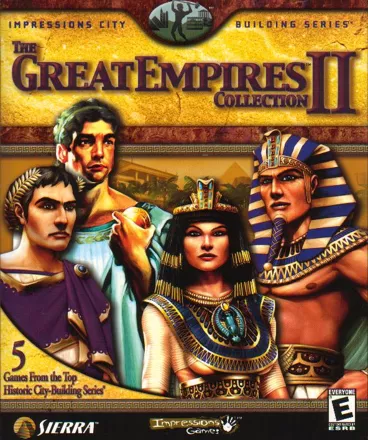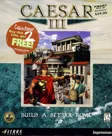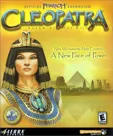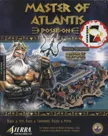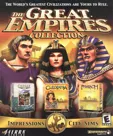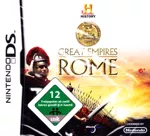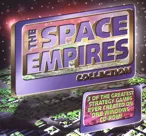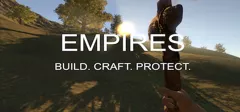The Great Empires Collection II
Description official description
This is the second collection of Sierra's city building series developed by Impressions Games. This collection includes:
- Caesar III
- Pharaoh
- Cleopatra: Queen of the Nile (expansion to Pharaoh)
- Zeus: Master of Olympus
- Zeus Official Expansion: Poseidon
Groups +
Reviews
Players
Average score: 4.2 out of 5 (based on 1 ratings)
Hundreds of hours of gaming enjoyment
The Good
-Everything. If you are the kind of gamer that's attracted to this genre of games, there is nothing to dislike. The games are challenging and fun, well-designed, and solidly implemented.
-The music is immersive, particularly in Pharaoh and Cleopatra (the inestimable Keith Zizza again).
-The gameplay is easy to learn, but rife with nuances that reward in-depth analysis of the game engine.
The Bad
-If I have any complaint about the games in this compilation, it's that Pharaoh and Cleopatra had some mild, very minor bugs related to non-essential stuff (like voices for your citizens). These bugs do not affect gameplay in any way.
-I'm not a huge fan of the episodic format of Zeus and Poseidon, and would have preferred a "March through time" career path as featured in Caesar III and Pharaoh/Cleopatra. But this is sheer personal preference.
The Bottom Line
This shovelware pack collects almost the entire Impressions City Building Series in one box. The only missing entry is Emperor: Rise of the Middle Kingdom
The City Building Series starts, oddly, with Caesar III. While there are obviously earlier games in the Caesar series, these games (Caesar and Caesar II) are sufficiently different that knowing how to play them will not give you a clue as to how to play Caesar III, Pharaoh, Zeus, or Emperor. The same holds true in reverse. Thus, when looking at the games from a game engine perspective, Caesar III is actually the first game of this series.
The best way to view these games, IMHO, is this:
Caesar III is the progenitor of the City Building Series proper. It is the game that introduced all of the basic gameplay elements that would follow in later games, particularly the "walkers." The walkers were a key feature of Caesar III that differentiated it from Caesar and Caesar II.
In Caesar and Caesar II, buildings that your citizens needed had an area of effect radius, similar to Police Stations and Fire Stations in the SimCity series. If your citizens' homes were within the area of effect of, say, a Theater, they got the benefits the Theater provided. So providing full coverage to your citizens of all the services they needed required designing cities with multiple overlapping areas of effect for each building type.
Caesar III did away with all that. In Caesar III, buildings that provided services would spit out walkers. As the walkers walked around your city, the homes they passed received the benefit of whatever service building spawned the walker. So if you put down a Theater in Caesar III, it would spawn an Actor walker, who would then walk around the neighborhood. The houses he passed received the benefit of the Theater (namely, increased Entertainment values).
This was a profound change from the previous two games in the series, and it required a completely different approach to designing and building cities. All of the subsequent games in the series have built on this design concept, which is why I insist that Caesar III, not Caesar, is the first game in this series.
Caesar III also introduced other basic concepts such as warehouses, foreign trade, sea trade, and so on.
Notably, when compared to the rest of the series, it lacked roadblocks. Given that roadblocks were put in the subsequent games due primarily to fan demand, their absence in Caesar III is easily understood and forgiven (particularly since you can, with only a minor amount of effort, make city gates confer the exact same benefit to your city as roadblocks provide to the other games). And since it's still possible to build functioning housing blocks without either gates or roadblocks, the lack of them isn't a problem, and is more of a challenge to your designing skills.
Pharoah and Cleopatra took the basic C3 engine and added a vatload of complexity. It was still the same basic engine, but with many more features: Monument construction, seasonal farming, industries requiring more than one type of raw material, and riverborne combat with boats, to name just a few. The numbers were also adjusted to make the game more challenging than C3: each level of housing holds less people than housing of comparable level in C3. Thus, keeping your industries filled with employees became much more of a challenge. Roadblocks were also added for the first time (they've since become a staple of the series) to help you control those errant walkers.
Pharaoh (and Cleopatra) is considered by many die-hard fans of the entire series to be the most challenging of the 4 games.
With Zeus, the game engine was given a major revamp. Gone were the labor walkers, who needed to pass by occupied housing in order to acquire employees for a given industry. Instead, any industry on the map would find employees as long as it was connected via road to any occupied housing.
Also gone were the forts. If your city was invaded, your citizens poured out of their houses to defend the town from invasion -- with a concommitant effect on your industry. (When all your employees are out fighting the bad guys, there aren't many left to make olive oil.)
Elite housing was made in a new way. In C3 and Pharaoh, if you wanted elite, high-tax housing, you had to grow it from small tents and shacks. In Zeus, you were given elite housing plots, which you could simply plop down anywhere you wanted (assuming they would fit, and you could support them, and the desirability of the area was sufficient).
Zeus also introduced the episodic format of the series (something that I, personally, consider a bit of a step backwards). Instead of starting at the dawn of time and going through the game city by city until the final mission, you are given a series of episodes. Each episode may have you developing multiple cities, and returning to one or more of them at various points of the game. You might start off building Athens for a few missions, then switch to building a colony city (which will provide goods to Athens when you're done), and then switch back to Athens (which will be exactly as you left it).
There were many other adjustments made to the basic City Building game engine that made it almost (but not quite) a new game. However, you could still see the skeleton of the C3 game engine underneath the hood.
As a die-hard fan of the entire Impressions City Building Series, one of the joys of playing the games is to appreciate how they changed from game to game. Playing the games in sequence, starting with Caesar III and working your way through to Emperor, really makes the differences between the various games stand out while simultaneously being similar enough to each other that mastering one of the games will get you 75% of the way to mastering any of the others.
Overall, this is a fantastic series, and if you're a fan of builder games, buying this compilation (along with Emperor) will be the best $40 you'll ever spend.
Windows · by Afterburner (486) · 2005
Analytics
Upgrade to MobyPro to view research rankings!
Identifiers +
Contribute
Are you familiar with this game? Help document and preserve this entry in video game history! If your contribution is approved, you will earn points and be credited as a contributor.
Contributors to this Entry
Game added by Lady_of_Magick.
Additional contributors: Plok.
Game added October 19, 2002. Last modified January 18, 2024.
